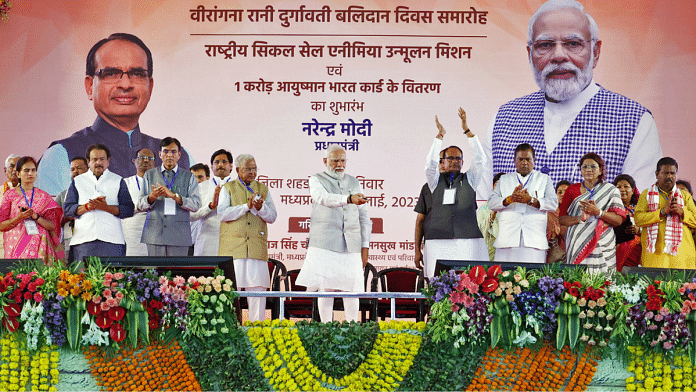New Delhi: Adults in India with sickle cell anaemia — a genetic condition that affects the shape of red blood cells — may soon get Pneumococcal Conjugate Vaccine (PCV) from the government as part of its National Sickle Cell Anaemia Elimination Mission launched by Prime Minister Narendra Modi on 1 July, ThePrint has learnt.
The National Technical Advisory Group on Immunization (NTAGI), the top advisory body on immunisation under the Union health ministry, last month discussed the importance of giving PCV to adults with sickle cell anaemia who may have missed the vaccine in their childhood.
Sickle cell anaemia, also known SCD, is one of a group of inherited disorders that affects the shape of red blood cells — the carrier of oxygen to all parts of the body. Red blood cells are normally round and flexible, which helps them move easily through blood vessels, but in sickle cell anaemia, they are shaped like sickles or crescent moons.
“Discussions are underway to include PCV for sickle cell patients as part of the National Health Mission as the vaccine prevents several serious complications in those suffering from the genetic condition,” an official in the ministry privy to the information told ThePrint.
The severity of the disease varies, and in severe cases, people experience periodic episodes of extreme pain, called pain crises.
There can be people with either carrier gene of SCD, in case one parent has the disease, while others have two faulty genes from both parents, making them have the full-blown condition. This can lead to severe pain episodes, infections, organ damage and early death.
The treatment for the disease is symptomatic with the only curative option being a bone marrow transplant that can only be offered in childhood and costs Rs 10-20 lakh.
“For this, NTAGI is gathering scientific evidence, while an exercise has also begun to assess the number of people who may need the vaccine and total expenditure it may require,” the official added.
According to medical experts ThePrint spoke to, the move may be significant and help improve the quality of life for a large number of people with the disorder.
Dr Gaurav Kharya, clinical lead, Hematology and Bone Marrow Transplant, Indraprastha Apollo Hospital, Delhi, explained that SCD patients have functional asplenia (absence of normal spleen function) due to ongoing damage to the spleen caused by deformed sickle-shaped RBCs.
“This puts them at increased risk of capsulated infections like H influenzae, pneumococcal and meningococcal infections,” Kharya told ThePrint.
“PCVs prevent the sicklers against these capsulated organisms, thus, reducing the morbidity and mortality risks,” he added.
Echoing Kharya, Dr J. P. Muliyil, virologist and former member of NTAGI also added that, “Offering PCVs to adult sickle cell patients is a remarkably good idea.”
Also Read: Tweak norms on ‘biosimilars’ to make new life-saving drugs cheaper — patient rights groups to govt
Focus on sickle cell anaemia
India has the second highest number of people with sickle cell anaemia in the world, after Nigeria. Most of them belong to tribal communities, where some groups have up to 40 per cent of their members affected by the disease, shows Union health ministry data.
According to this data, the states reporting the highest number of patients include Madhya Pradesh, Gujarat, Maharashtra, Chhattisgarh and Tamil Nadu, among others.
To tackle this major health problem, especially among the tribal population, the government launched the National Sickle Cell Anaemia Elimination Mission on 1 July at Shahdol, Madhya Pradesh.
The mission, which was proposed in the Union Budget 2023, targets screening approximately seven crore people under 40 years of age over the next three years and aims to eliminate the disease by 2047.
Dr Amit Agrwal, an SCD researcher who is also associated with the Sickle Cell Association in Nagpur, Maharashtra, told ThePrint that nationwide programme to eliminate the disease should mostly focus on creating massive awareness, providing genetic counselling, conducting prenatal and newborn screening and offering treatment support to those with the disease.
“Since curing the disease (through bone marrow transplant) is very difficult and extremely expensive, costing around Rs 20-25 lakh per patient, much can be achieved by preventing the SCD numbers in India from rising,” he added.
(Edited by Richa Mishra)
Also Read: From disease surveillance to aiding diagnoses — how AI tools are revolutionising Indian healthcare



